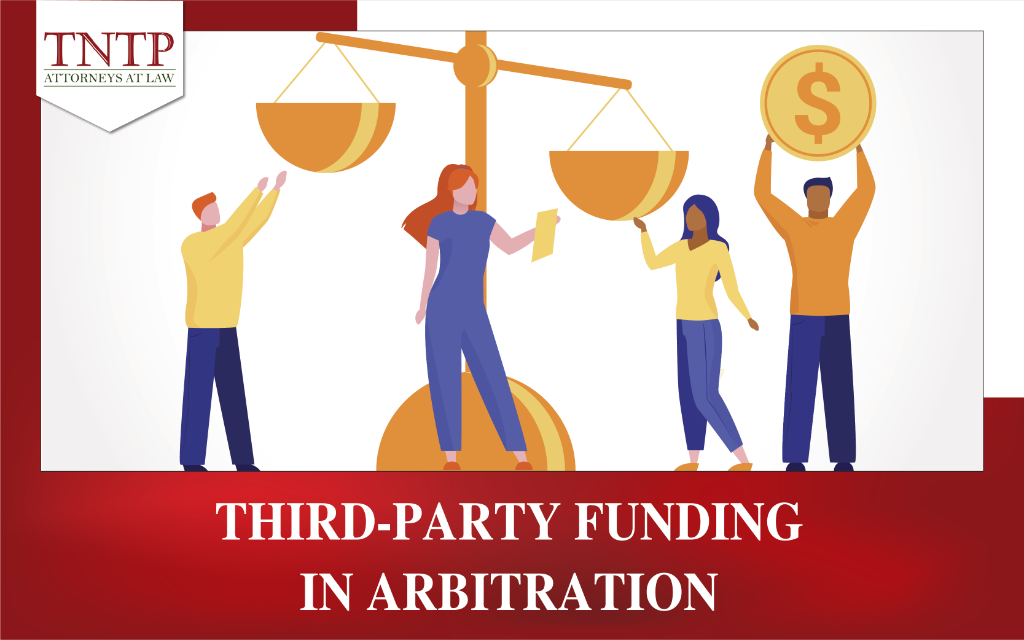Arbitration has become one of the most popular dispute resolution methods in the commercial field. However, the cost and fee of participating in arbitration proceedings is a significant barrier that prevents parties from choosing this dispute resolution method. In this article, TNTP will introduce to readers the concept of third-party funding in arbitration, a method that is becoming increasingly popular worldwide but is still relatively new in Vietnam.
1. The concept and characteristics of third-party funding
Third-party funding refers to the involvement of a third entity, which is neither a disputing party nor has any legal relationship to the parties or the dispute itself, typically financial organizations. The funding entities will support one of the disputing parties in arbitration by covering legal expenses such as attorney fees, expert witnesses, consultants, and any other related or necessary costs throughout the dispute resolution process, usually under a funding agreement. The funding party receives a percentage of the award or a predetermined amount if the arbitration award is economically favourable to the funded party or if a beneficial settlement is reached. However, if the funded party loses the case, depending on the agreement, the funding party is responsible for paying the amounts related to economic obligations imposed on the funded party by the arbitration award, such as liabilities to the winning party, attorney fees, and other costs.
Third-party funding is characterized by the following points:
• The service users: The users of the service are typically claimants in a dispute. Defendants can also utilize funding services in situations where they face financial difficulties or when filing a counterclaim.
• The funding organizations: Insurance companies, institutional financiers, and other financial institutions such as corporations, banks, and hedge funds are the most common funders. They act as financial providers and do not intervene in the dispute resolution process of the funded party.
• The costs covered include legal expenses of one party such as attorney fees, expert witnesses, consultants, and any other related or necessary costs incurred during the dispute resolution process.
• Third-party funding is popularly used in high-value commercial disputes, especially in investment disputes between states and investors resolved through the mechanism of the International Centre for Settlement of Investment Disputes (ICSID) or through arbitration under investment protection agreements.
2. The role of third-party funding in arbitration proceedings
Third-party funding can be an effective method for parties in the dispute resolution process due to its benefits, specifically:
• Third-party funding allows parties with weaker financial resources to defend their rights and interests in arbitration proceedings. Financially weaker parties can be dominated by those with stronger financial resources, and, in some cases, they may be forced to accept a lower compensation amount than the actual damages due to the costs of arbitration exceeding their financial capacity. Through the financial support of a third party, the funded party can remove the domination of the stronger party, leading to a more objective resolution process.
• Third-party funding also helps to stabilize the financial situation of the parties involved in arbitration, avoiding bankruptcy due to pursuing arbitration. Moreover, under the funding agreement, if the arbitration tribunal’s award is not economically favourable to the funded party, depending on the agreement, the funder will pay the costs and economic obligations in the award, thereby reducing the financial burden on the funded party.
• Third-party funding can also serve as a means of assessing before proceeding with further strategies. Upon receiving a funding request, the third party will usually conduct an assessment and analysis of the case, the possibility of winning the case, and the chance for recovery in the event of a favourable decision for the funded party. Since this assessment is carried out by an objective third party, it can serve as valuable information for the parties before deciding whether to follow the case, use the funding, or withdraw the lawsuit.
3. Considerations for third-party funding in arbitration
Following the positive aspects that third-party funding may bring to the arbitration process, this method also carries certain risks as follows:
• In terms of the economic aspects of the arbitration award, funders will receive a significant portion of the money awarded to the funded party. However, funders always have strategies to mitigate risks to their investment in cases where the arbitration award is not in the favor of the funded party. Therefore, if the arbitration award is not economically favourable to the funded party, certain agreements might impose additional payments to compensate the funder, increasing the financial obligations of the funded party.
• Although funders are not allowed to interfere in the dispute resolution process, they can request the funded party to seek higher compensation as they are more interested in their profit than the outcome of the case. Such an approach can sometimes conflict with the interests of the funded party, leading to the parties cannot resolve the dispute through negotiation or mediation.
Third-party funding in arbitration presents a model with many growth opportunities, especially as more and more disputes are being resolved through arbitration mechanisms. However, this method is still relatively new in Vietnam, with no specific regulations governing it. When a party wants to use this method, besides the benefits it offers, they should also consider other factors as well as the potential risks involved.
This is the article “Third-Party Funding in Arbitration” by TNTP. Should you have anything that needs to be discussed, please feel free to contact TNTP for assistance.
Best regards,







